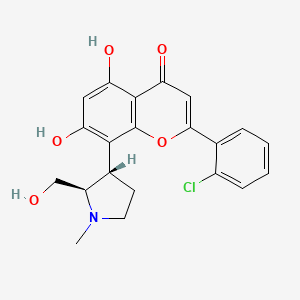m6A-centered Drug Response Information
General Information of the Drug (ID: M6APDG01093)
| Name |
P-276
|
||||
|---|---|---|---|---|---|
| Synonyms |
CDK4 inhibitor (cancer), Nicholas Piramal; P-664-02; CDK4 inhibitor (iv, cancer), Piramal Life Sciences; CDK4 inhibitor(iv, cancer), NPIL Research & Development
Click to Show/Hide
|
||||
| Status |
Phase 2
|
||||
| Structure |
 |
||||
| Formula |
C21H20ClNO5
|
||||
| InChI |
1S/C21H20ClNO5/c1-23-7-6-12(14(23)10-24)19-15(25)8-16(26)20-17(27)9-18(28-21(19)20)11-4-2-3-5-13(11)22/h2-5,8-9,12,14,24-26H,6-7,10H2,1H3/t12-,14+/m1/s1
|
||||
| InChIKey |
QLUYMIVVAYRECT-OCCSQVGLSA-N
|
||||
| PubChem CID | |||||
| TTD Drug ID | |||||
Target Gene(s) and Their Upstream m6A Regulator, Together with the Effect of Target Gene(s) in Drug Response
The target genes involved in drug-target interaction (such as drug-metabolizing enzymes, drug transporters and therapeutic targets) and drug-mediated cell death signaling (including modulating DNA damage and repair capacity, escaping from drug-induced apoptosis, autophagy, cellular metabolic reprogramming, oncogenic bypass signaling, cell microenvironment, cell stemness, etc.) could be regulated by m6A regulator(s) and affected their corresponding drug response. You can browse detailed information on drug-related target gene(s) mediated by m6A regulators.
Cyclin-dependent kinase 1 (CDK1)
Methyltransferase-like 3 (METTL3)
| In total 1 mechanisms lead to this potential drug response | ||||
| Response Summary | Cyclin-dependent kinase 1 (CDK1) is a therapeutic target for P-276. The Methyltransferase-like 3 (METTL3) has potential in affecting the response of P-276 through regulating the expression of Cyclin-dependent kinase 1 (CDK1). | [1], [2] | ||
Protein virilizer homolog (VIRMA)
| In total 1 mechanisms lead to this potential drug response | ||||
| Response Summary | Cyclin-dependent kinase 1 (CDK1) is a therapeutic target for P-276. The Protein virilizer homolog (VIRMA) has potential in affecting the response of P-276 through regulating the expression of Cyclin-dependent kinase 1 (CDK1). | [2], [3] | ||
Cyclin-dependent kinase 4 (CDK4)
Insulin-like growth factor 2 mRNA-binding protein 1 (IGF2BP1)
| In total 1 mechanisms lead to this potential drug response | ||||
| Response Summary | Cyclin-dependent kinase 4 (CDK4) is a therapeutic target for P-276. The Insulin-like growth factor 2 mRNA-binding protein 1 (IGF2BP1) has potential in affecting the response of P-276 through regulating the expression of Cyclin-dependent kinase 4 (CDK4). | [4], [5] | ||
Protein virilizer homolog (VIRMA)
| In total 1 mechanisms lead to this potential drug response | ||||
| Response Summary | Cyclin-dependent kinase 4 (CDK4) is a therapeutic target for P-276. The Protein virilizer homolog (VIRMA) has potential in affecting the response of P-276 through regulating the expression of Cyclin-dependent kinase 4 (CDK4). | [4], [5] | ||
YTH domain-containing family protein 1 (YTHDF1)
| In total 1 mechanisms lead to this potential drug response | ||||
| Response Summary | Cyclin-dependent kinase 4 (CDK4) is a therapeutic target for P-276. The YTH domain-containing family protein 1 (YTHDF1) has potential in affecting the response of P-276 through regulating the expression of Cyclin-dependent kinase 4 (CDK4). | [5], [6] | ||
References